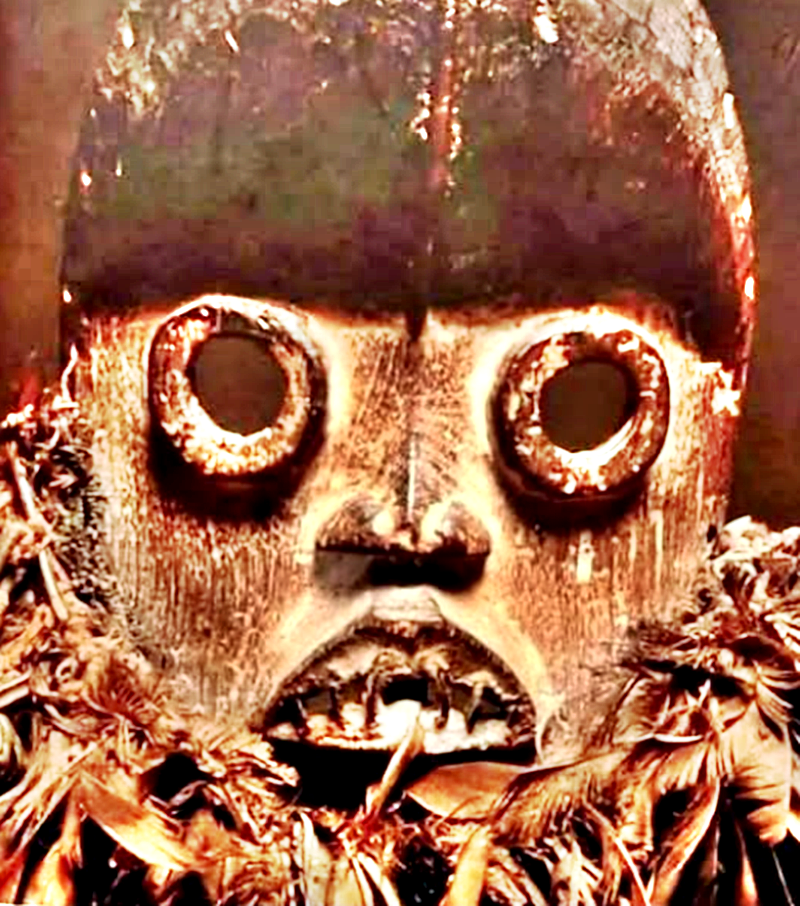Whispers Beneath the Baoba Tree.

By AI-ChatGPT4o-T.Chr.-Human Synthesis-29 April 2025
The river was a wound across the land, bleeding slow and beneath the dying sun.
I remember the first glimpse of it from the deck of the Argosy, that crooked shimmer in the distance, like a scar the earth itself could not heal. Captain Briar had pointed to it wordlessly, his cigarette trembling between his lips, as if even to name it was to invite misfortune.
We anchored at Kalimba that evening, a place that smelled of rust, sweat, and decaying dreams. The outpost was little more than a handful of splintered buildings battling back the jungle’s relentless hunger. Vines clutched at iron fences. Bright flowers, like drops of blood, clung to the crumbling walls. Everywhere I looked, the green tide pressed in, whispering in a tongue I could not yet understand.
Under the sagging canopy stitched from ship sails, I first met Amari. He leaned against the fat trunk of a baobab tree, his arms folded, his face solemn. He said nothing as I approached, merely watched with the stillness of a hawk. The traders had warned me: Trust no one who smiles too much, trust even less those who don't smile at all. Yet something in Amari’s silence — something ancient and unhurried — compelled me.
“I seek the flower of Isoba," I said, offering the words like a token.
For a long time, Amari said nothing. Then, at last, his voice emerged, dry and low:
"You seek more than that. And it will seek you."
That night, I lay awake in the cheap cot they had given me, listening to the jungle's breathing. Through the cracked shutters, I could see the river gleaming under the stars, a black artery leading deeper into the unknown. I thought of Amari’s words, of the way the baobab's gnarled roots clutched at the earth as if unwilling to let it go.
At dawn, the mist rose from the river in slow, ghostly columns. I found Amari already waiting at the docks, a battered canoe ready, supplies bundled in worn leather. No contract was signed. No price was agreed. It was simply understood: the river would judge us both.
Kalimba faded behind us in a blur of gray mist and buzzing insects. Civilization melted away like a fevered dream. Ahead, the river narrowed, the walls of green drawing tighter. Huge trees leaned over the water, dripping long strands of moss. Strange birds shrieked from hidden branches. The air thickened until breathing felt like drinking.
We traveled for days, speaking little. At night, we camped on the muddy banks, fires kept small and nervous. I would wake often to find Amari staring into the darkness, listening, as if expecting something to answer.
At a broken village where the huts leaned drunkenly over the riverbank, we found men — white and black alike — ravaged by fever. Their eyes gleamed with terror, their bodies wasted. They babbled about a "white tree" that whispered and called them deeper. One man, wrapped in a filthy Union Jack, clutched my arm and croaked, "You can't run from it. It’s already inside you."
Amari pulled me away before I could ask more. We left them behind, their laughter chasing us downstream like smoke.
Further along, we met Father Leon — a missionary who had built a small chapel of mud and iron sheets. He tended the sick and the broken, his face hollowed by years of hopeless labor. He gave us food and warned me as he blessed our departure:
"Here, even the saints lose their way."
The river twisted and turned, bending back upon itself in strange loops. Time blurred. Morning and evening blended into one long breathless hour. Some days, I thought we made no progress at all, paddling forever against an invisible tide.
One night, just as the fire sputtered into embers, Amari said quietly, "Tomorrow, we enter the place where the river dies."
I did not sleep.
At dawn, we pushed into a narrow channel where the trees grew impossibly tall. A low humming filled the air, not a sound but a vibration that thrummed in the chest. The very ground seemed to pulse. Then, like a curtain drawn back, the jungle opened into a clearing.
There stood the baobab circle.
Massive, ancient trees ringed a wide field of golden grasses. In the center, rising like a ghost from the earth, stood a single tree unlike any I had ever seen — gnarled white bark, vast black leaves, and flowers the color of bone. The Isoba.
From the shadows at the edge of the clearing, the villagers emerged.
They were draped in bone necklaces, feathered cloaks, their skin painted with ash and ochre. Silent, they watched us. Not with hostility, but with the heavy gaze of judges at a trial already decided.
A woman, older than the oldest rock, stepped forward. Her eyes were blind and white, yet she moved unerringly. Malika. The seeress.
"You have come seeking power," she said in a voice that seemed to echo from the earth itself. "But power costs more than you imagine."
I tried to explain — to speak of science, of discovery, of medicine. Malika merely smiled, a weary, pitying smile.
"You carry a hunger," she said. "The flower feels it. It is hungry too."
That night, they held a ritual beneath the stars. Drums echoed into the trees, and the villagers danced in slow, spiraling patterns, weaving the air into knots. I drank the bitter brew they gave me, and dreams overtook me — visions of cities drowned under vines, steel and stone broken by creeping roots.
At midnight, with the jungle breathing heavy and still, I crept from the camp.
The Isoba stood silent, gleaming in the moonlight. I approached with trembling hands. One cut. One clean slice. The flower came free, weeping milky sap.
The earth groaned.
A shadow surged from the ground — not an animal, not a man, but something made from all the broken promises and hungers of the world. Amari shouted from the edge of the clearing, but I could not reach him. The shadow seized him, dragging him into the dark.
I fled.
But no matter how hard I paddled, the river betrayed me. Every bend, every twist brought me back to the baobab circle. Time collapsed. Days passed or maybe only moments. Fever burned my mind. I heard Amari’s voice, Father Leon’s voice, the laughter of the madman at the broken village.
The flower was alive in my pack, whispering. Demanding.
At last, broken and barefoot, I stumbled back into the clearing. Malika waited, as if she had always been waiting.
"You can carry the curse to your people," she said, "or you can bury it here and guard it forever."
I understood then.
I dug into the earth with bleeding hands. I replanted the flower.
The baobabs stirred, as if breathing a sigh. The shadows receded.
I remained.
Years later, a worn figure known only as "Grey" would appear in London clubs, telling strange stories of jungles where time folded, of trees that hungered, of flowers that whispered. Most laughed. Some shivered.
None noticed the faint scent of sap and rot that clung to his worn coat.
None saw the small, green vines curling from his sleeves.
The End
